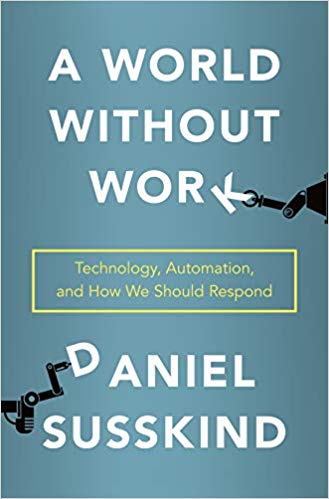You have /5 articles left.
Sign up for a free account or log in.
 A World Without Work: Technology, Automation, and How We Should Respond by Daniel Susskind
A World Without Work: Technology, Automation, and How We Should Respond by Daniel Susskind
Published in January 2020
In A World Without Work, Daniel Susskind takes the heretical position (for an economist) that the robots are poised to take our jobs. For Susskind, this jobless future is inevitable and will arrive within the next few decades.
No doubt many of you are already sympathetic to the world-without-work thesis. Or, if you are a card-carrying economist, skeptical of claims of a future of technologically driven unemployment.
Susskind has spent a decade thinking of nothing much but the future of work and has produced a book worthy of this focus. A World Without Work does a superb job of tracing the history of concerns, almost all unfounded to date, that automation replaces work. He reviews the reasons why the shift from an agrarian to an industrial economy in the West did not result in half of all workers ending up without work.
Susskind takes the story of the Age of Labor up to the present moment, articulating the reasons why our service economy boasts low unemployment rates while acknowledging the current challenges of male labor force participation.
For Susskind, the maturity of AI technologies over the years to come will result in task replacement across almost every occupation. Robots will not only build cars but drive and service them as well.
In high-wage countries, it will be cheaper to replace people with machines across almost every job. Pizza-making robots will replace pizza-making humans, and touch-screen ordering will replace servers.
A World Without Work makes a strong and internally consistent argument as to why AI-driven technological advances are different from previous technology revolutions, and why this next shift will eliminate much of the work that humans perform.
Where Susskind is less successful is in his recommendations for what to do in response. He advocates for a conditional basic income (CBI, in contrast to a universal basic income (UBI) -- arguing that placing requirements on state income transfers will both guard against nativism and ensure that society's work gets done.
The book's arguments for a CBI are too brief, however, to answer potential objections. A World Without Work would have been a more persuasive book if it retained its focus on the what is likely to happen with jobs, rather than straying into the politics and policies of our jobless future.
How will technological unemployment play out in higher ed?
In some ways, today's campuses already resemble the job market that Susskind envisions in the future.
There is not enough teaching work to go around to support the number of people who have trained to teach college. The current causes of adjunctification have more to do with demand than technology, but an academic ecosystem of underemployed workers hints at the broader labor market to come.
Will robots take the remaining good jobs in higher ed?
My sense is that AI is the least of our employment problem. Declining numbers of high school graduates, drops in public funding and competition from other postsecondary providers are the forces that are likely to put even more pressure on the higher ed workforce.
Will AI-enabled online adaptive learning courses that enroll thousands of students displace professors in the future? I would argue not likely. Technology-enabled instruction may raise the floor of instruction, but authentic learning is difficult to scale.
What is valuable in a college education is the relationship between educators and learners. The more technology we throw at education, the more the need to invest in educators becomes apparent.
Tomorrow's students will insist that their tuition dollars buy quality learning environments. This quality may be built on a floor of AI-driven adaptive learning platforms. But these platforms will only be the starting place, not the destination.
Transactional methods of education will be as commoditized, and therefore cheap, as Duolingo.
Any college or university that follows an educator-less education strategy will be signing its death warrant.
If higher ed educator jobs are safe from the robots, what about all of us staff?
Here, the case for task replacement on campus is much stronger. Just as word processing and email eliminated most administrative assistants from departments, artificial intelligence will eliminate many of the medium-skilled jobs that universities support.
An excellent book could be written on the future of higher ed work.
What are your favorite books on the question of robots taking the jobs?
What are you reading?








